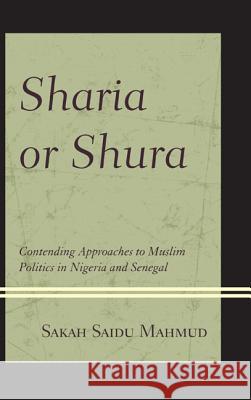Sharia or Shura: Contending Approaches to Muslim Politics in Nigeria and Senegal » książka
Sharia or Shura: Contending Approaches to Muslim Politics in Nigeria and Senegal
ISBN-13: 9780739175644 / Angielski / Twarda / 2013 / 196 str.
Sharia or Shura: Contending Approaches to Muslim Politics in Nigeria and Senegal
ISBN-13: 9780739175644 / Angielski / Twarda / 2013 / 196 str.
(netto: 421,20 VAT: 5%)
Najniższa cena z 30 dni: 408,29 zł
ok. 30 dni roboczych.
Darmowa dostawa!
This book explores the differences in Muslim attitudes and approaches to the public square in sub-Saharan Africa via a comparative-historical analysis of Muslim politics in Northern Nigeria and Senegal since independence in 1960. While Northern Nigeria has been mired in intermittent religious conflicts and violence, Senegal has maintained peaceful and tolerant relationships in inter-faith and public affairs. Yet, the two Muslim societies had similar Islamic backgrounds in Sufi orders --Qadiriya and Tijaniya in Northern Nigeria; and Tijaniya, Muridiya, Qadiriya and Lahiniya in Senegal -- known for their peaceful approach to public affairs. Furthermore, the two Muslim societies belong to the "black African Islamic cultural zone." These common traits would suggest similar approaches to public affairs, but this has not been the case. The salient factors which are analyzed in the book include the historical factors (the success or failure to establish an Islamic state and the impact of different colonial administrations and ideologies), the extent of homogeneity of the social structure in each country, and strength of the contemporary state in both countries. The combination of these factors illustrates the experiences of the Muslims which further determine their divergent approaches to the public square.











